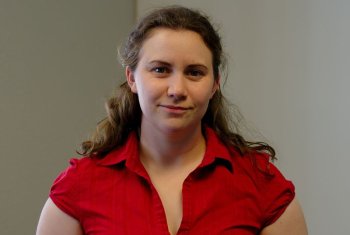Author: Tina Gasperson
Pia Waugh is a leading advocate for FLOSS in her home country, Australia, and all over the world. In addition to running a consultancy in partnership with her husband, she is the vice president of Linux Australia, the president of Software Freedom International (sponsor of the annual Software Freedom Day events), and on the board of directors of the OLPC Australia program. Perhaps because her activities are born out of a love for open source software, or maybe because her husband Jeff is also a major figure in global FLOSS, Waugh says the balance between work and life for her right now is “nonexistent. But we love what we do.”

Waugh was introduced to Debian Linux about nine years ago. “I took to [it] immediately,” she says. “I really enjoyed tinkering with the software, learning how it worked, and I ultimately learned more in six months of Linux about general computing than I did in over 10 years of DOS, Windows, and Netware.” In addition to the transparency of open source, Waugh says working with the software gave her a sense of personal empowerment, and it was fun. “I … started going to the Sydney Linux User Group, which in itself was a whole new experience. I really felt a part of something bigger, something important, and after about three years of focusing on Linux and other FOSS projects, I started to really understand the broader socio-economic impact, and the importance of software freedom in a rapidly digital world.”
Eventually Waugh was inspired enough to get involved with the Australian national Linux community organisation. “I thought that helping get Linux Australia back on its feet with a strong community would be a good contribution, and a great way to get FOSS into the public eye, so I helped arrange the first public annual general meeting in January 2003, thinking I would run for an ordinary committee member.” Instead, Waugh got a big surprise when she was elected president of Linux Australia. “I had some amazing individuals supporting and advising me who helped shape both my commitment to the community and how I could effectively ‘herd cats.'”
Being the president and bringing Linux Australia back to life weren’t enough for Waugh, so she got involved with Software Freedom International’s Software Freedom Day, founded by Matt Oquist, Henrik Omma, and Phil Harper, in 2004. Software Freedom Day organizers aim to educate the general public about the benefits of using high-quality free and open source software. Waugh eventually became the president of SFI, and every September you’ll find her promoting Software Freedom Day events around the world.

Waugh is pleased with the resurgence of community in Australia. “We have more than 35 user groups, and a national organisation with more than 1,500 members. There is also a strong industry presence with a national organisation called Open Source Industry Australia with more than 150 members and counting. I have not found in any other country such a cohesive and collaborative industry and community. I think Australia is well represented in terms of community and industry, but only really in the past couple of years have we started to see serious mainstream takeup and acceptance of open source in the public and at a management level. Technical people in the public and private sectors have often been using it for many years under the radar.
“I think we are in something of a boom of Australian corporate and government takeup of open source. I think this is partially due to the strengthening of the industry here, and partially due to the abysmal failure of Vista to provide any additional value to the individual or corporate environment. This has spurred many CIOs and CTOs to actively evaluate open source alternatives, and by and large, they seem to like what they see. I think loads of individuals have been empowered by Linux distributions like Ubuntu which made it really easy to acquire and set up Linux, and projects like the OpenDisc that prepackage FOSS applications that run on Windows.”
Waugh envisions a growth in global connectedness and the role of FLOSS in reaching that goal. “The global digital divide means that a large portion of the planet is disconnected [which is] a more dangerous and divisive gap than anything we have seen. Those online have access to knowledge, opportunities, new work, and most importantly, new perspectives.” Waugh says that the open source community provides a model to the world of how community should be done. “People daily look straight past cultural, political, racial, age, and gender divides to get on with making great software. We see here a real global society that provides a model that can transcend many of the conflicts facing the world today. I am very excited about a world where its children are better educated and diversely connected, which I believe will help bring about acceptance, compassion, and ultimately a better world. Most bad behaviour in the world is due to ignorance, isolation, and segregation, and when people from a young age can actually access a different view, then they can start to think critically about their influences and about the impact they want to have on the world. I am doing my part through promoting FOSS (which empowers people through access to and participation in the information economy) and through trying to tackle digital access head on with projects in Australia and the Pacific.”
Waugh says it doesn’t take too much to become sought-after in the FLOSS arena. “All it takes is commitment to getting involved. My participation in the community is singularly the most important thing I have done, and I will always continue to contribute my time and efforts to the FOSS community. This participation in the community is vital to learning, making networks, and building a reputation. Then you should try to find out the best way you can personally contribute. I have always enjoyed getting in and getting things done, and my contributions on boards and in projects have been the best ways I can contribute. Some people can hack, some can contribute bug reports, some can write documentation. They are all equally important contributions to make. Ultimately make sure you have fun and participate in the spirit of sharing and freedom, and you’ll achieve whatever you set out to.”
Being a woman hasn’t hindered Waugh at all in the FLOSS community. “I have found more opportunities and respect within the community than I have in the Australian ICT industry. Australia has very few women, or technical women, in ICT, and in the FOSS community I found this wonderful ethos where people are judged on their contributions, not on who they are or what they believe. Often, as is the case with Ubuntu, there is a clear code of conduct that you can rely on to oust inappropriate behaviour, and this is very comforting. I have very occassionally had or seen a major issue, and for every person who creates an issue, there are many thousands more who totally rock! In this community there are either ways to deal with issues, or other great projects to go to with great people. There are also groups like LinuxChix and Debian Women that provide a level of support and camaraderie that I highly value.”
Waugh is excited about the future for FLOSS, especially in the corporate arena. “I see more companies getting on the bandwagon (and sometimes with wrong intentions), and I see the community
flourishing as FOSS really takes off in the mainstream. There will always be a place for FOSS user groups, because even as the skills become mainstream there will always be people who are either committed to the idealogy of software freedom, and/or geeky beyond the mainstream, and both types are my kinds of people!
“Technology-wise I think we will see a lot more Web-centric projects, more collaboration tools, and the application of FOSS methodologies applied in new and interesting ways. I think we are seeing a huge wakeup from the mainstream, and people looking for something different, so we’ll likely see more tools for non-technical end users. I believe the concept of the commons will permeate not only the ICT sector but many others, and this will hopefully have a profound impact on everything from research methodologies to education.”
Our Portraits series seeks to profile individuals who are doing interesting things with free and open source software. If you know of someone you’d like to read about, please let us know.
Categories:
- Open Source
- Advocacy



